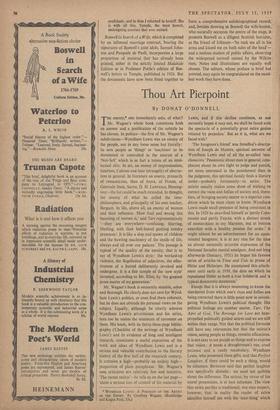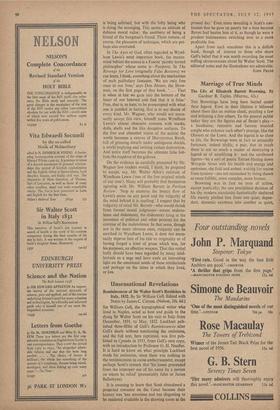Thou Art Pierpoint
By DONAT O'DONNELL
HE enemy,* one immediately asks, of what?
I Mr. Wagner's whole book constitutes both an answer and a justification of the subtitle he
has chosen. In politics—the first of Mr. Wagner's subdivisions—Wyndham Lewis was an enemy of the people, not in any loose sense but literally : he sees people as 'things' or 'machines' to be dominated or controlled in the interest of a `Not-Self' which is in fact a totem of an intel- lectual elite. In art, an enemy of impressionism, futurism, Cubism and later (strangely) of abstrac- tion in general. In literature an enemy, primarily of romanticism, then of Joyce, of Proust, of Gertrude Stein, Sartre, D. H. Lawrence, Heming- way—the list could be much extended. In thought, the enemy of what he called the time- philosophers, and principally of his own teacher, Bergson. In life, above all, an enemy of women and their influence. 'How foul and wrong this haunting of women is,' said Tarr representatively `—they are everywhere—confusing, blurring, libelling, with their half-baked gushing tawdry presences! It is like a slop and spawn of children and the bawling machinery of the inside of life, always and all over our palaces.' The passage is typical of the quality of the enmity, that is to say of Wyndham Lewis's style : the worked-up violence, the flagellation of adjectives, the effec- tiveness of a hatred deliberately invoked and undergone. It is a fair sample of the 'new style' invented, according to Mr. Eliot, by 'the greatest prose master of my generation.'
Mr. Wagner's book is eminently sensible, sober and thorough. He clearly does not care for Wynd- ham Lewis's politics, or even find them coherent, but he does not obtrude his personal views on the subject. Equally, although he clearly admires Wyndham Lewis's art-criticism and his satire, here too he makes the minimum of comment on them. His book, with its thirty-three-page biblio- graphy (`Checklist of the writings of Wyndham Lewis') and its evidence of long and intelligent research, constitutes a useful exposition of the work and ideas of Wyndham Lewis and is a serious and valuable contribution to the literary history of the first half of the twentieth century. It contains a high—probably an unduly high— proportion of plain paraphrase : Mr. Wagner's own criticisms are relatively few and tentative. The recent satires'—he tells us on the last page— 'show a serious loss of control of his material by * WYNDHAM LEWIS: A PORTRAIT OP THE ARTIST AS THE. ENEMY. By Geoffrey Wagner. (Routledge and Kegan Paul, 35s.)
Lewis, and if this decline continues, as one earnestly hopes it may not, we shall be faced with the spectacle of a potentially great satire genius vitiated by prejudice.' But as it is, what are we faced with?
`The hangman's friend' was Stendhal's descrip- tion of Joseph de Maistre, spiritual ancestor of Wyndham Lewis and of all the so-called 'neo- classicists.' Pessimistic about man in general, com- placent about its own right to judge and punish, yet more interested in the punishment than in the judgment, this spiritual family finds a literary outlet—probably fortunately—in satire. The satirist usually makes some show of wishing to correct the vices and follies of society and, there- fore, of bringing society nearer to a superior con- dition which he must claim to know. Wyndham Lewis made small pretence of being consistent in this. In 1929 he described himself as 'partly Com- munist and partly Fascist, with a distinct streak of monarchism in my Marxism, but at bottom anarchist with a healthy passion for order.' It might almost be art advertisement for an open- minded hangman; it is at any rate for the time an almost uncannily accurate expression of the National Socialist mental amalgam. And not long afterwards (January, 1931) he began his famous series of articles ,in Time and Tide in praise of Hitler and Hitlerism. He maintained this attach- ment until early in 1939, the date on which he repudiated Hitler as both a true bolshevik and 'a typical democratic statesman.'
Except that it is always interesting to know the standpoint from which one's vices and follies are being corrected there is little point now in investi- gating Wyndham Lewis's political thought. His political feelings are another matter. Tarr, The Apes of God, The Revenge for Love are hate- propelled politically guided satires and we are still within their range. Not that the political formulae still have any relevancies but that the satirist's vision, seeing people as things, remains efficacious. It is not easy to see people as things and to express that vision : it needs a draughtsman's eye, cruel patience and a ready vocabulary. Wyndham Lewis, who possessed these gifts, said that Perfect Laughter, if there could be such a thing, would be inhuman. Bernanos said that perfect laughter• was specifically diabolic : we need not quibble about the difference. The satirist, by virtue of his moral pretensions, is at best inhuman. The view that satire purifies is traditional; one may suspect, however, that in reality the reader of satire identifies himself not with the 'man-thing' which
is being satirised, but with the lofty being who is doing the scourging. This seems an attitude of dubious moral value : the snobbery of being a friend of the hangman's friend. There remain, of course, the pleasures of technique, which are per- haps also overrated.
In The Apes of God, often regarded as Wynd- ham Lewis's most important book, the master- mind behind the scenes is a Fascist 'painter turned philosopher' whose name is—Pierpoint. In The Revenge for Love (originally False Bottoms) we can learn, I think, something about the mechanism of such patibulary fantasies. 'We are only free once in our lives,' says Don Alvaro, the Show- man, on the first page of that book. . . That is when at last we gaze into the bottom of the heart of our beloved and find that it is false.' Free, that is, to hate; to be preoccupied with what one is justified in hating, that is to say shams of every kind. Mr. Wagner, who would not neces- sarily accept this view, himself notes Wyndham Lewis's almost obsessive concern with masks, dolls, shells and the like deceptive surfaces. To the free and alienated vision of the satirist the world becomes a canvas of Hieronymus Bosch, full of grinning dwarfs under ambiguous shields, a world implying and inviting violent destruction. And satire itself becomes the ultimate false bot- tom, the trapdoor of the gallows.
On the evidence so carefully presented by Mr. Wagner few readers would, I think, be prepared to accept, say, Mr. Walter Allen's estimate of Wyndham Lewis ('one of the few original minds of our time'). Many will probably find themselves agreeing with Mr. William Barrett in Partisan Review: 'Stop to examine the breezy flow of Lewis's prose on any point and the vulgarity of the mind behind it is startling.' I suspect that by vulgarity of mind Mr. Barrett—who would shrink from formal moral judgments—meant malevo lence and dishonesty, the dishonesty lying in the invention of political and other pretexts for the exercise of the malevolence. In that sense, though not in the more obvious ones, vulgarity can be ascribed to Wyndham Lewis; it does not neces- sarily deprive him of his title to originality or of having forged a kind of prose which was, for his purposes, an effective weapon. That this verbal bully should have been regarded by many intel- lectuals as a sage and hero casts an interesting light on the emotional needs of these intellectuals and perhaps on the times in which they lived, or live. -















































 Previous page
Previous page